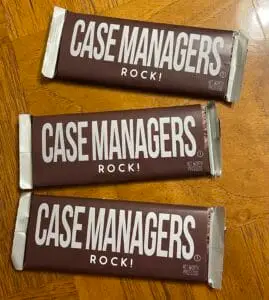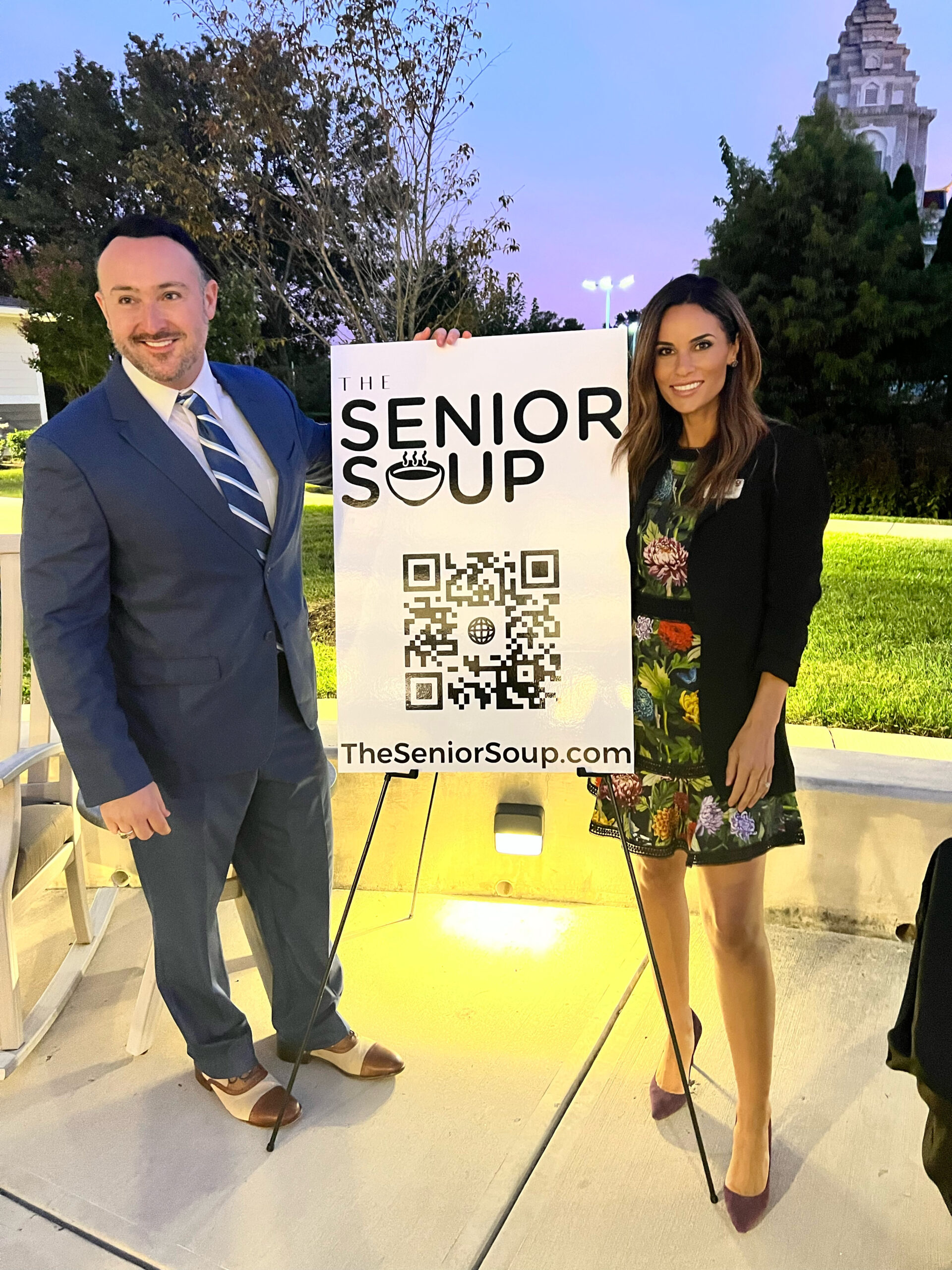In episode four of The Senior Soup Podcast, we discuss the three primary components of hospital case management:
- Discharge Planning
- Utilization Review
- Transitional Care
We enjoyed discussing the multifaceted world of case management with Margie Hackett, Suburban Hospital’s seasoned manager of transitional care and population health.
We Educate You About Hospital Case Management Teams
Our interview with Margie took place at Suburban Hospital.
This audio podcast and its corresponding summary aim to educate Maryland, older adults, and their families about hospital case management teams’ critical role within a hospital setting and the many ways they help patients after their discharge.
What Do Hospital Case Managers Do and How They Can Help You
You may not know it, but hospital case management teams are essential to every patient’s hospital stay and are involved in all aspects of their hospitalization.
Case managers:
- Help streamline patient care from admission to discharge and beyond;
- Ensure patients receive the proper care at the right time;
- Arrange patient discharges;
- Introduce patients to the most critical healthcare services, ensuring that patients have everything they need to recover at home and avoid hospital readmittance;
Remember, a hospital case management team’s primary goal is to ensure every patient is safely discharged into the community.
Discharge Planners Help Your Safely Discharge From A Hospital Stay
A patient’s hospital journey begins with discharge planning, which starts when they are first admitted and introduced to their discharge planner.
Hospital discharge planners:
- Assess patients’ medical and social needs and plan their post-discharge phase.
- Consider several factors, such as the patient’s home environment, available support, and insurance coverage, to ensure every patient has a safe discharge.
- Conduct patient assessments and screenings when patients first arrive at the hospital;
- Determine patients’ healthcare needs at home and assess how well they manage within their homes.

What Is Hospital Utilization Management?
Hospital utilization management focuses on cost-effectively using hospital resources while maintaining high-quality care.
Case managers work closely with patients’ health insurance providers to ensure they receive necessary treatments without undue financial burdens.
They might help, they might help get authorizations to place in a facility after the hospital, if that’s what they need, or they will help with transfers to other hospitals, home health, that sort of thing.
What Is Hospital Transitional Care and Population Health?
Hospital transitional care and population health extend the scope of patient care beyond the hospital’s walls.
It’s about getting patients to the next level of care, picking up that care, and continuing care within the community.
Transitional care and population health play crucial roles in patient recovery and long-term health, helping patients manage in their homes and receive effective in-home healthcare services.
From coordinating follow-up visits to managing medication, transitional care prevents gaps in care that could lead to complications or hospital readmissions.
Transitional care and population health typically involve:
- Helping patients transition from the hospital to a skilled nursing facility or into their homes;
- Supporting patients within their communities;
- Managing patients’ chronic conditions;
- Connecting patients with their primary care providers and scheduling follow-up appointments post-discharge;
- Accessing patient medications;
- Educating patients on self-management techniques to prevent hospital readmissions.
- Coordinating with family members and caregivers.
Many physician practices have case managers embedded in their offices to help patients navigate care issues unrelated to hospital stays.
Who Makes Up a Hospital Case Management Team?
Hospital case management teams are diverse healthcare professionals, including nurses, social workers, and others.
Each healthcare professional contributes to providing patients with holistic care and addressing their physical, emotional, and social needs during and after a hospital stay.
Whether managing congestive heart failure or coordinating with primary care providers, a hospital case management team ensures patients experience a full continuum of care throughout their healthcare journey.
Case Managers Ensure Safe Hospital Discharges
A safe discharge is paramount for patients to thrive at home.
- Case managers ensure that patients have a support system, whether family, friends, or professional caregivers.
- They also coordinate services like home health care or private duty aid, addressing any mobility or medical needs that might arise post-discharge.
The Hospital Case Management Framework
One insightful aspect of hospital case management that Margie shared with us involves a discharge planning template she learned through an accredited American Case Management Association course.
This template encapsulates the essence of case management duties and responsibilities into three critical planning stages:
- Plan for the Day
- Plan for the Stay
- Plan for the Way
This structured approach to case management reflects the thoughtful and patient-centric philosophy that guides case managers in their work.
By planning for the day, the stay, and the way, case managers ensure that each patient’s journey through the healthcare system is as smooth, safe, and supportive as possible.
Plan for the Day
Every day in the hospital, case managers set clear goals and take specific steps to address a patient’s current health situation.
Case managers ensure that patients’ daily needs are met, ensuring their needs are taken care of, including any immediate medical issues and treatments.
Plan for the Stay
Looking beyond the day-to-day, case managers also develop a comprehensive plan for patients’ entire hospital stay.
This involves anticipating the patient’s journey through recovery, setting realistic discharge dates, and adjusting plans based on the patient’s progress.
This step aims to map out a pathway to ensure patients receive the necessary care, support, and interventions during their hospital stay.
Plan for the Way
This critical phase involves preparing the patient for their transition back home or to another care setting, ensuring continuity of care, and addressing any potential challenges that might arise post-discharge.
It’s about laying the groundwork for patients to leave the hospital safely and thrive in their subsequent environment, clearly understanding their ongoing care needs and how to manage their health moving forward.
Case Managers Are Your Hospital Advocates
Hospital case managers are advocates for their patients and their families, guiding them through the healthcare system and ensuring their voices are heard.
They educate patients and their families on a variety of helpful resources, and they help patients navigate insurance coverage and support decision-making to align with patients’ wishes and healthcare goals.
These types of care managers are often licensed clinical social workers.
Tips on How To Prepare For A Hospital Stay
Build a Great Relationship with Your Primary Care Doctor
Regular check-ups and open communication with your primary care doctor can help prevent hospital stays.
However, if a hospital visit becomes necessary, having a trusted community healthcare provider can make all the difference in your care and recovery.
Establish Trust With Your Hospital Case Management Team
Hospital case managers are there to support and advocate for patients.
Patients and families should try to build relationships with case managers (if they can) during hospital stays.
You will learn to trust their expertise.
Please do not hesitate to ask them questions or express concerns about your hospital stay or discharge plan.
A hospital case manager aims to ensure a patient’s well-being during hospitalization and beyond and to facilitate the best possible healthcare outcomes.
Advocate for Yourself During Your Hospital Stay
Self-advocacy is crucial during a hospital stay.
Ensure that you understand your treatment plan. Ask questions and voice your needs and preferences.
Your involvement in your care is critical to achieving the most desirable health outcomes.
How You Can Support Your Local Hospital
Supporting hospital initiatives, whether through volunteering or donations, strengthens community health services and ensures that hospitals can continue providing essential care management programs.
Regardless of size, every contribution helps advance patient care and support health education initiatives.
Margie discussed several specific ways the community can support its local hospitals. She emphasized the importance of community contributions toward enhancing hospital services and programs.
These suggestions highlight how individuals and the broader community can support a hospital’s mission to provide comprehensive care.
Contribute To A Hospital Foundation
Margie mentioned that every hospital has a foundation that collects money to fund special projects or staff education.
Donations to these foundations can support various initiatives not covered by the hospital’s budget, including patient care programs, staff education, and the purchase of new equipment.
Individuals can contribute financially to these foundations to help enhance the hospital’s services.
Support Your Hospitals’ Speciality Programs
The funds collected by hospital foundations also support special programs that benefit the community, such as health education initiatives and partnerships with private duty home care agencies.
By donating, community members can ensure these programs continue to serve patients effectively and provide essential services that might not be available otherwise.
Your Financial Support Provides Continuing Education to Case Managers
Margie highlighted the importance of continuing education for nursing staff and other hospital employees.
Donations can help pay for nurses and other hospital staff to attend conferences and educational programs that enhance their professional skills and ability to provide high-quality care.
Supporting hospital staff education initiatives ensures that patients receive the most up-to-date and effective treatments possible.
Support Your Hospital’s Community Health Initiatives
Your financial contributions can also support initiatives to improve the community’s health outside the hospital.
These initiatives could include outreach programs, preventive health screenings, and education on managing chronic conditions.
By supporting these initiatives, donors help extend the hospital’s impact beyond its walls, contributing to the overall health and well-being of the community.
You Can Volunteer Your Time At Your Local Hospital
While Margie focused on financial contributions in the podcast, hospitals also benefit significantly from volunteers’ time and expertise.
Community members can support hospitals by volunteering in various capacities, from patient care support to administrative help or participation in health education programs.
Understanding The Senior Soup’s Hospital Case Management Guide
Hospital case management is a vital service that supports patients through some of their most challenging times.
By understanding how case management works and what resources are available, older adults and their families can navigate their healthcare journeys more confidently and effectively.
We hope this guide has illuminated the path to better health and well-being for you or your loved ones.
Remember, you’re not alone—a team of dedicated healthcare professionals is ready to support you.
How The Senior Soup Can Help Older Adults & Their Families
- Expert Interviews: Featuring healthcare professionals and senior service providers to offer insights and guidance.
- Resource Hub: Providing a comprehensive resource guide for senior resources, from home care options and healthcare providers to financial and estate planning.
- Advocacy and Education: Empowering seniors and their families with the knowledge to make critical life decisions.
Contact and Connect with Raquel and Ryan
We encourage listeners to reach out to us with topics they want to learn more about.
Contact Raquel and Ryan at:
- Ryan: Ryan@TheSeniorSoup.com
- Raquel: Raquel@TheSeniorSoup.com
- Call or Text The Senior Soup at (202) 350-2674
- Facebook Messanger: http://m.me/107672818779042
To explore our healthcare guides and comprehensive resource directory, please visit our Senior Soup Homepage.
Subscribe and Listen to The Senior Soup Podcast
Please visit our Senior Soup Podcast homepage for a comprehensive listing of each of our podcast episodes.
You can listen and subscribe to our podcast on many of the major podcast directories, including:
Follow The Senior Soup on Social Media
Thank You For Listening!
Thank you for joining us on this journey.
The Senior Soup is committed to providing valuable, engaging, and trustworthy content to support our older-adult community.

